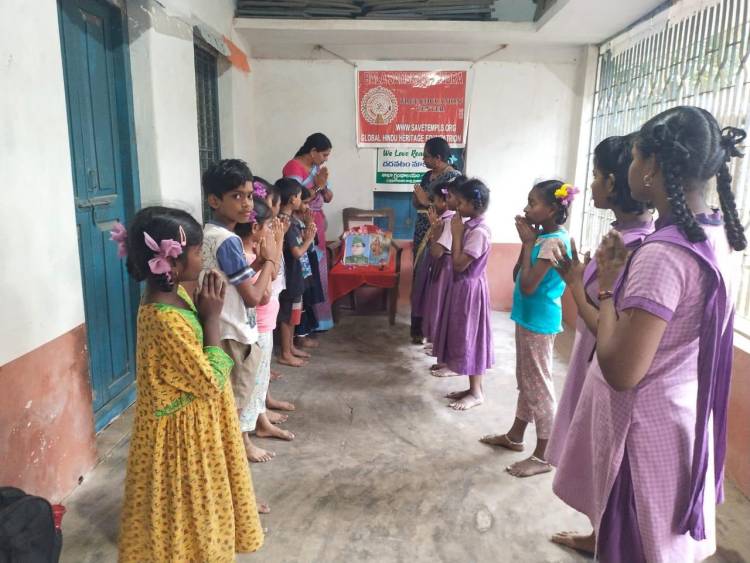[GHHF] Bala Samskar Students learned about the greatness of Subash Chandra Bose and his struggle to liberate India from British.
 “One individual may die for an idea, but that idea will, after his death, incarnate itself in a thousand lives.” Subash Chandra Bose
“One individual may die for an idea, but that idea will, after his death, incarnate itself in a thousand lives.” Subash Chandra Bose
Global Hindu Heritage Foundation is very proud to say that we are teaching our Bala Samskar Students about the greatness and life stories of national heroes, famous people, and great saints. This week we talked about Subash Chandra Bose.
Many great leaders fought for the independence of our India. Among them, Netaji Subhash Chandra Bose was a wonderful person. His courage, sacrifice, patriotism, and work for the people inspired us all.
Subhash Chandra Bose was born on January 23, 1897, in a village called Cuttack in the state of Odisha. His father Jankibeen Bose was a famous businessman, and his mother Amrita Bose was an educated woman and raised the family with love. Since childhood, Subhash was very intelligent and inquisitive. He achieved good results in school.
Subhash went from Cuttack to Calicut (Kolkata) for his education. Then he was interested not only in studies, but also in the movement for independence. He was very talented in school. But after completing his studies, he could not accept the British rule and started fighting for the independence of India.
Subhash went to England to study at Cambridge University and began a daring journey for India's independence.
Subhash Chandra Bose became a participant in the Indian independence movement in the 1920s. Following Gandhiji's direction, he entered society and started agitating for the people. In the 1930s, Subhash became a key leader in the Indian National Congress (INC) party. His struggle for independence was different from Gandhiji's words. He tried many ways to give a tough answer to the British government that was opposing him.
Subhash Chandra Bose decided to continue the larger struggle for independence and went to Germany in 1941. There, he held talks with the German government and formed the 'Azad Hind Fauj' (Indian National Army). He raised the slogan "Jai Hind!" to start a strong war against India with the help of Germany, Italy, and Japan.
The Azad Hind Fauj was formed in 1942 under the leadership of Subhash Chandra Bose. This army played a key role in ending the British rule in India. In 1944, the army faced the British forces and captured some areas in North India.
Subhash Chandra Bose faced many hardships for the country. He was always blocked by everyone who fought against the British government.
Subhash Chandra Bose was affectionately called "Netaji" by the people of India. They considered him their leader and his words, deeds and sacrifices inspired them.
According to the official announcement, Bose died in a plane crash on August 18, 1945, while traveling to Tokyo via Taiwan. But his body was never found. Many stories are popular that he might have survived this.
The life of Subhash Chandra Bose teaches us many good lessons. He devoted his life to liberating our country with his wisdom, courage and patriotism. His efforts teach us self-confidence and courage. The slogan "Jai Hind!" should always be in our hearts, we should also be ready to serve the country, we should develop leadership and courage...
We should always remember the struggle of Netaji ji. Along with him, we should also serve our country, love the country and stand as a guide for everyone.
Your donations are appreciated;
By Zelle: ghhfusaorg@gmail.com
PayPal: savetemples.org
By Check: Or you can send a check payable to GHHF, 14726 Harmony Lane, Frisco, TX 75035.
It is tax-deductible.
By Rupees: call 601-918-7111; +91 83096 43979





















 Urgent support needed for Bangladesh Hindus
Urgent support needed for Bangladesh Hindus 







